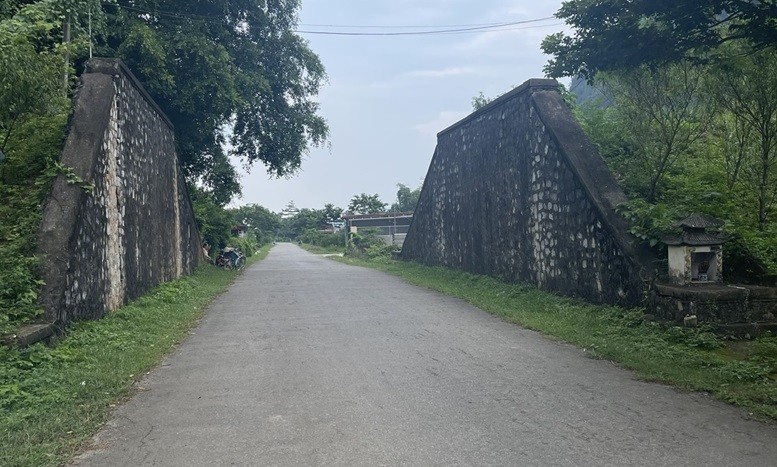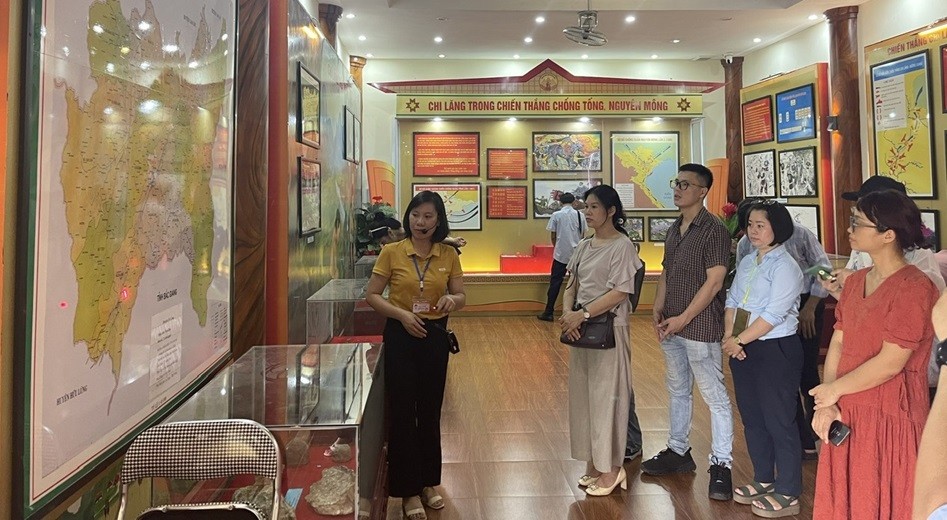
Chi Lang: Tourism development potential associated with historical relics
Latest
 |
| Chi Lang Mountain Pass is a sacred land, a landmark of fierce battles that crushed the invasions of the Northern feudal lords. (Photo: Hong Hanh) |
Chi Lang is a mountainous district located in the southwest of Lang Son province, where many ethnic groups live, including the Nung ethnic group (50.8%), the Tay ethnic group (34.9%), and the Kinh ethnic group (12.8%). The other ethnic groups (Dao, Hoa, Muong, Cao Lan, San Chi, Ngai) account for about 1.5%. Currently, there are 112 relics in the district, including 56 revolutionary historical relics, 10 scenic relics, 6 archaeological relics, 40 religious relics.
Advantages with many historical relics
It is wellworth to notice 3 national-graded relics including 2 relics (Lang Nac Grotto and Gio Grotto) and Chi Lang historical relic area); 5 provincial-level relics include: Na Ngum Cave (Bang Huu commune), Bo Nam cave (Bang Huu commune), Yen Ma hill (Quang Lang commune), Phai Sa site (Hoa Binh commune), Reverend Patriarchal (Cao Duc Thanh Ca) Temple (Chi Lang town). These relics are mostly located in the chain of Chi Lang historical relics, reprenting themselves as great potential for tourism development.
With the efforts of relevant authorized levels, branches and people, Chi Lang district's tourism has prospered, and the number of tourists and visitors to the district has gradually increased over the years. In 2022, roughly 120,000 tourists were attracted to visit the district, an increase of 4 folds compared to 2021. In the first 6 months of 2023, it attracts over 100,000 tourists, exceeding 80% of the annual plan, equal to 83% of the year 2022, not yet commendable while the district's potential remains.
Mr. Vi Quang Trung, Vice Chairman of Chi Lang District People's Committee said: “Currently, Chi Lang district focuses on instructing the agencies, units, branches and organizations in the area to promote the value of historical relics and cultural heritage associated with tourism development. From 2022, the district has focused on operating two main tourist routes. Sightseeing route No. 1, Cultural and spiritual historical tourism, includes: “Chau Nam” Five Altar Temple (Chi Lang town) – “Chi Lang” Victory Gallery – “Quy Mon” Demon Arch Temple (Chi Lang commune) – “Chau Bat” Eight Altar Temple, “Mieu Co Chin” The Ninth Aunt Jothouse (Dong Mo town) – “Chau Muoi” Ten Altar Temple (Hoa Binh commune). The Sightseeing route number 2: Cultural historical and agricultural ecological tourism: Chi Lang Victory Exhibition House - Fortification of the Mountain Pass Luy Ai - “Quy Mon” Demon Arch Temple - Chi Lang Pass - Devil's Face Mountain – safe agricultural product zone with plantation of custard apple and Pomelo (Chi Lang commune and Dong Mo town).
“Currently, Chi Lang district is coordinating and linking with the Lang Son Geopark Management Board to operate the Tourist route No. 3, including districts: Bac Son - Van Quan - Chi Lang - City Lang Son", Mr. Trung further revealed.
Regarding the existence of numerous historical relics, there is great potential to develop tourism associated with the region's historical relics. According to Ms. Dinh Thi Thao, Chief Officer of Chi Lang district Office of Culture and Information, local tourism activities are not commensurate with the potential, they are still spontaneous, most of the current tourism operation are separate and passive. Tours and tourist routes have not been regularly formed to make a local brand name of attraction.
The number of visitors to relic sites is still very small, only crowded in a few days of festivals such as: Tran Temple Festival in Nhan Ly commune (January 6); Mo Village Communal House Festival (January 7), Dong Mo Town Festival (January 10), Chau Muoi Ten Altar Temple Festival (Mo Ba Commune, Hoa Binh Commune – Lunar January 11), Trung Lang Pagoda Festival (January 11- March 15 of the lunar calendar); Hang Vi Festival in Chien Thang commune (January 20)…
Tourism to become a key economic sector
To promote tourism to become an important economic sector of the district, Mr. Vi Quang Trung said: The Party Committees, authorities at all levels and relevant units in Chi Lang district Lang has focused resources, deployed many synchronous solutions, focusing on forming unique, characteristic, branded and highly competitive tourism products, creating highlights to attract tourists.
 |
| Chi Lang Victory Exhibition House was built in 1982 - a place to store documents and materials related to the entire Chi Lang historical relic. (Photo: Hong Hanh) |
At the same time, the locality focuses on preserving and promoting the value of Chi Lang Historical Relic Area - a special National Monument, in traditional education, research and study associated with local tourism development. It is the common effort to welcome about 8,200 international visitors and more than 194,000 domestic visitors by 2025, so that the total revenue from tourists will reach about VND 172 billion.
With diverse tourism potential, differences in both nature and culture, especially the values of national historical relics and cultural identities of Chi Lang ethnic groups, along with the efforts of the government and people in the district, historical relics based tourism in Chi Lang will certainly create great attraction for tourists and truly become a new approach for local economic development.













